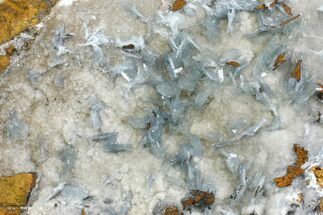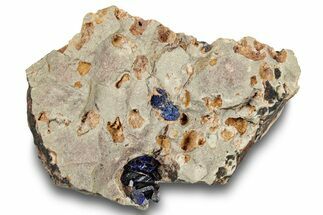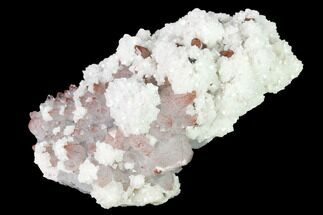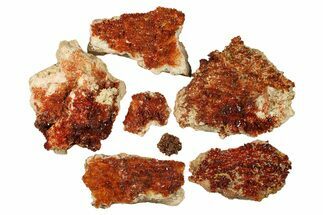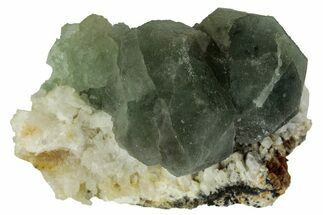This Specimen has been sold.
3.6" Blue Bladed Barite Crystal Clusters with Calcite - Morocco
This is a spectacular, specimen of bladed blue barite that formed in association with calcite. The calcite encrusts most of the matrix under the barite, with a gorgeous, 1.65" wide cluster of blue bladed barite that formed over the calcite. The entire specimen measures 3.6 x 1.6" and it was collected from the Nador Province of Morocco.
Barite, commonly spelled baryte, is well-known for its great range of colors and varied crystal forms and habits. = It is a heavy mineral consisting of barium sulfate, and typically has the chemical formula of BaSO4. The barite group consists of baryte, celestine, anglesite, and anhydrite. It is generally white to colorless and is the main source of barium.
About Calcite Crystals
Calcite crystals are a form of calcium carbonate (CaCO₃) known for their diverse shapes, transparency, and vibrant range of colors. They typically form in rhombohedral, scalenohedral, or prismatic shapes, often with well-defined, sharp edges and glossy surfaces. Calcite crystals are often translucent or transparent, sometimes displaying a double refraction effect where objects viewed through the crystal appear doubled. They can appear in various colors—white, clear, yellow, pink, blue, green, and orange—depending on impurities or trace minerals.
A notable characteristic of calcite is its reaction with weak acids like vinegar, which causes it to effervesce, or fizz, as it releases carbon dioxide. This property makes calcite crystals a key tool in geological identification and studies. Calcite forms in many environments, from sedimentary rocks like limestone and marble to hydrothermal veins.
Calcite crystals are a form of calcium carbonate (CaCO₃) known for their diverse shapes, transparency, and vibrant range of colors. They typically form in rhombohedral, scalenohedral, or prismatic shapes, often with well-defined, sharp edges and glossy surfaces. Calcite crystals are often translucent or transparent, sometimes displaying a double refraction effect where objects viewed through the crystal appear doubled. They can appear in various colors—white, clear, yellow, pink, blue, green, and orange—depending on impurities or trace minerals.
A notable characteristic of calcite is its reaction with weak acids like vinegar, which causes it to effervesce, or fizz, as it releases carbon dioxide. This property makes calcite crystals a key tool in geological identification and studies. Calcite forms in many environments, from sedimentary rocks like limestone and marble to hydrothermal veins.
SPECIES
Barite & Calcite
LOCATION
Jebel Ouichane, Sagangane, Guelaia Cercle, Nador Province, Oriental Region, Morocco
SIZE
Entire specimen 3.6 x 1.6", Barite cluster is 1.65" wide
CATEGORY
ITEM
#204045
 Reviews
Reviews
